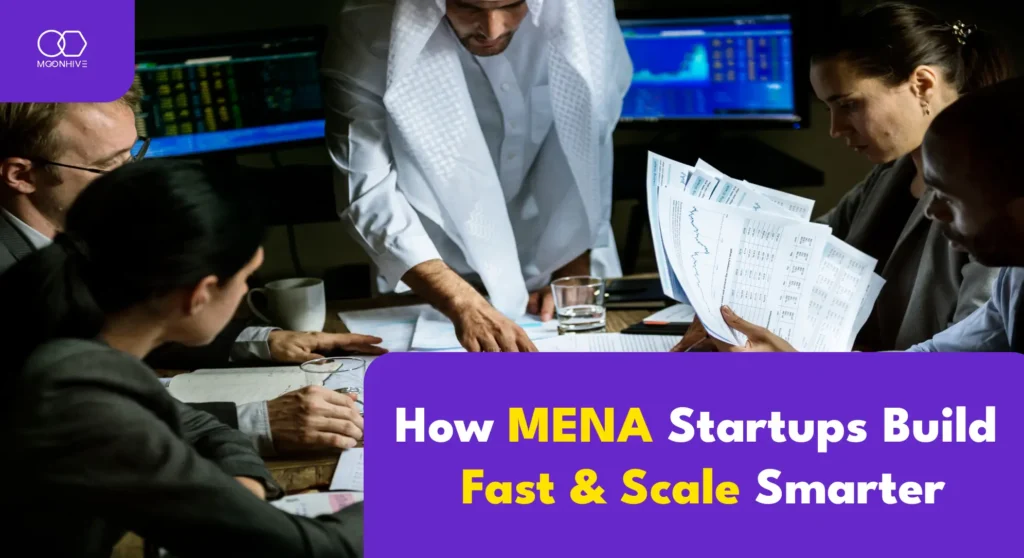MVP development for startups in UAE, Saudi Arabia, Egypt, and Jordan is now a critical strategy for survival and growth. For founders in the region, building a startup today is both an opportunity and a challenge. With government-backed programs, growing venture capital, and accelerator ecosystems, the region is fertile ground for new ideas.
Yet, despite the optimism, too many startups fail early. One core reason: building full products too soon. Founders spend months and capital on polished platforms, only to discover later that customers don’t engage, investors aren’t convinced, or the product needs a pivot.
The alternative. MVP development for startups a lean, strategic approach that allows early validation, smarter spending, and quicker market entry.
Related read: MVP Development
The Challenge of MVP Development for Startups in MENA
1. Funding Gaps
- Pre-seed and seed investors in UAE and Saudi Arabia
- want to see proof, not ideas.
- Without an MVP, startup seed funding preparation and advisory becomes nearly impossible.
- PowerPoint decks no longer cut it traction does.
2. Limited Tech Teams
- Many startups lack dedicated engineering capacity.
- Building in-house tech is costly, especially in Dubai, Riyadh, or Doha.
- Outsourcing without strategy risks poor quality unless guided by startup agile development coaching.
3. Overbuilding and Wasted Resources
- Founders mistakenly equate “full product” with “investment readiness.”
- Reality: You risk burning capital before finding product-market fit strategies for tech startups.
4. Intense Competition
- From fintech startup launch services in Dubai to e-commerce platforms in Egypt, speed wins.
- Competitors often release a lightweight MVP, capture first users, and dominate faster.
Why MVPs Matter More Than Full Products
What an MVP Really Means
An MVP isn’t about launching something incomplete; it’s about launching the right core product at the right time. It’s designed to:
- Test assumptions,
- Engage real users, and
- Provide measurable learning.
Benefits for Pre-Seed & Seed Startups
- Speed: Launch in weeks, not years.
- Cost Efficiency: Average MVP costs in MENA range between $10k–$20k, versus six-figure full builds.
- Investor Appeal: MVP traction = stronger case for startup funding and acceleration in UAE, Saudi, or Egypt.
- Flexibility: With lean data, pivots are easier before scaling with custom software solutions.
How MVPs Fit the MENA Startup Ecosystem
- Alignment with Accelerators
- Programs in UAE, KSA, and Egypt favor startups with MVPs.
- Accelerators use MVPs to measure founder execution, user traction, and growth potential.
- Government Initiatives
- UAE’s Hub71 and Saudi’s Vision 2030 push innovation but expect founders to show validation.
- Kuwait, Bahrain, and Jordan offer startup ecosystem support, but MVP-backed startups qualify faster.
- Investor Perspective
- VCs and angels in MENA look for proof of startup customer acquisition strategies, not theory.
- An MVP communicates execution capability, lean methodology, and adaptability.
Best Practices for Building MVPs in MENA
- Start with Problem Clarity
- Don’t rush into coding. Define the problem you’re solving.
- Use startup business planning workshops in Saudi Arabia or UAE incubators for structured validation.
- Prioritize Core Features
- MVP ≠ stripped-down product, but essential-only product.
- Focus on solving one key pain point exceptionally well.
- Leverage Local Insights
- Regional user behavior in fintech (cash-based societies), e-commerce (logistics challenges), and SaaS (SME adoption) should guide MVP design.
- Adopt Lean & Agile Practices
- Work with teams experienced in lean startup MVP development support.
- Sprint-based builds allow constant feedback and pivoting.
- Plan a Scalable Roadmap
- MVP should feed into startup product roadmap development services.
- Think: MVP → Early adopters → Product-market fit → Growth.
Conclusion
For founders across UAE, Saudi Arabia, Egypt, Qatar, Bahrain, and Jordan, the message is clear: Don’t overbuild. Focus on MVPs that validate quickly, save resources, and position your startup for sustainable growth.
